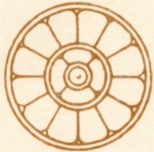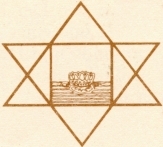Sri Aurobindo - Integral Yoga or Purna-Yoga
|
Master Sri Aurobindo is widely seen as a modern philosopher, but his philosophy was the gnostic philosophy of a master. Enlightenment - so master Sri Aurobindo - is not a toy that is layed into the hands of children. Human thought in the generality of men is no more than a rough and crude acceptance of unexamined ideas. Our mind is a sleepy or careless sentry and allows anything to pass the gates which seems to it decently garbed or wears a plausible appearance or can mumble anything that resembles some familiar password. Especially is this so in subtle matters, those remote from the concrete facts of our physical life and environment. Even men who will reason carefully and acutely in ordinary matters and there consider vigilance against error an intellectual or a practical duty, are yet content with the most careless stumbling when they get upon higher and more difficult ground. Where precision and subtle thinking are most needed, there they are most impatient of it and averse to the labour demanded of them. Men can manage fine thought about palpable things, but to think subtly about the subtle is too great a strain on the grossness of our intellects; so we are content with making a dab at the truth, like the painter who threw his brush at his picture when he could not get the effect that he desired. We mistake the smudge that results for the perfect form of a verity.(Essays in Philosophy and Yoga, pg. 270)
But one must not confuse this with past or present notions of superhumanity. For in the mental conception superhumanity consists in a man rising above the normal human level, not by a higher kind, but only by a higher degree of the same kind : "Spirituality is very different from rationality. The appearance points out that a bigger power tries to reveal than the normal mind. (Life Divine II, 24) "Our true self must become our center and the individual parts in us must open themselves to the cosmic consciousness", (Sri Aurobindo, The Life Divine II, 26) " The supramental being will bring the individual self in union with the cosmic self, the will and the acting of the indiuvidual being with the cosmic will and with the cosmic work" "The gnosic consciousness is a consciousness in which all contradictions are cancelled or fused into each other in a higher light of seeing and being, in a unified self-knowledge and worldknowledge. "This bliss (the Ananda - which fats out of the highesr diviner love), which forces so absolutely, is the declare in the DIVINE... According to Sri Aurobindo, the cosmos arose from and is governed by the ONE in an all-encompassing and pervasive manner: "Obviously He must be omnipresent, omniscient and omnipotent ........Nothing else can exist outside of this consciousness........No other will, no other power and no other consciousness can raise an objection against it from outside or inside, because there is no consciousness and no power, which would be outside of the One, and all energies and formations of knowledge within it are none other than the One". (Life Divine I, pg. 170) "If mankind could but see though in a glimpse of fleeting experience what infinite enjoyments, what perfect forces, what luminous reaches of spontaneous knowledge, what wide calms of our being lie waiting for us in the tracts which our animal evolution has not yet conquered, they would leave all and never rest till they had gained these treasures. But the way is narrow, the doors are hard to force, and fear, distrust and scepticism are there, sentinels of Nature, to forbid the turning away of our feet from her ordinary pastures", ". "Fate is adrsta, the unseen thing which the Spirit holds hidden in the plan of its vision, the consequence concealed from the travailing mind absorbed in the work of the moment by the curtained nearnesses or the far invisible reaches of Time. Fate is niyati, the thing willed and executed by Nature, who is power of the Spirit, according to a fixed law of its self-governed workings. But since this Eternal and Infinite, our greater Self, is also the universal being, man in the universe is inseparably one with all the rest of existence, not a soul working out its isolated spiritual destiny and nature while all other beings are nothing but his environment and means or obstacles, — that they are indeed, but they are much more to him, — which is the impression cast on the mind by the thought or the religions that emphasise too much his centre of individuality or his aim of personal salvation." (Sri Aurobindo The supramental manifestation') But the "Mother" admitted openly in her "evening-talks" that things are determined to be as they are, because they are the expression of the divine will." (22.2.1956) There exist no official methods of the purna-yoga. Sri Aurobindo said in his first years that "pranayama, pranayama ..." is the best method. * The books of Sri Aurobindo are for download as PDF on the website of the Sri Aurobindo Asram and on Intyoga-Fr and on miraura.org. and at Holybooks. The books af the Mother are available as Pdf at holybooks. * Notebook on evolution (The mother) == Links ==
|
of Spirituality
universal-path.org

